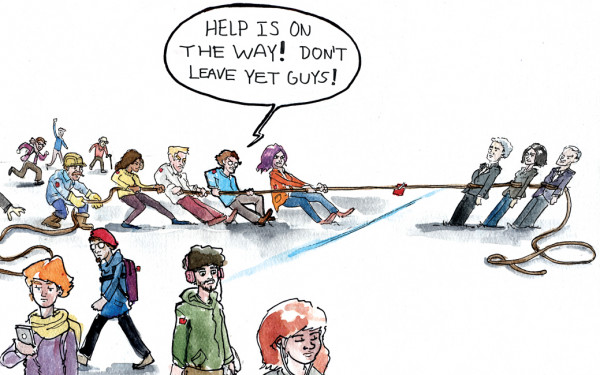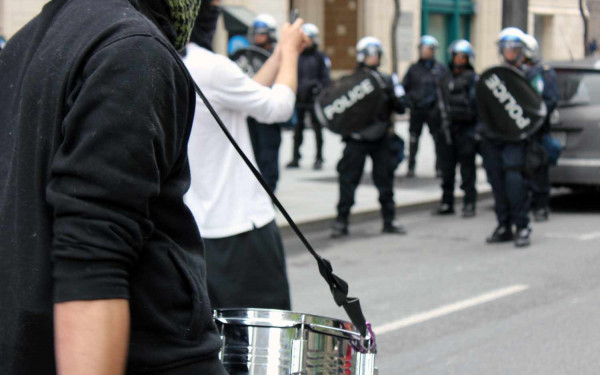Surf’s Down
Quebec Surfing Community Protest Dumping Sewage in River
There was a weird ambiance at the Lachine Canal’s dock station among the young surfers who had paddled the whole morning on the choppy waters. Most of them had their lips pulled back, grinning as they enjoyed their last paddle session of the season. But underneath those temporary smiles, bigger concerns were hiding.
On a gloomy Sunday morning, 50 people from Quebec’s surfing community united to protest against Montreal’s plan to dump sewage into the St. Lawrence River. Kayakers, surfers and paddle boarders gathered around the Lachine Canal, close to the marina, to voice their displeasure.
“I surf here about four to five times a week,” said Jade Chretien, a 20-year-old river surfing addict. “For the small surfing community that lives here in Montreal, the river represents our little escape from town. The raw sewage discharge is really infuriating everyone here.”
Approximately eight billion litres of untreated wastewater will be dumped into the St. Lawrence River for “necessary weeklong repairs” beginning Oct. 18. In total, the equivalent of 2,600 Olympic swimming pools filled with raw sewage coming from industries, homes and hospitals will be released from 26 exit points from LaSalle to the eastern tip of the island.
1_700_1050_90.jpg)
This is coming from a province that recently released a multi-year strategy to enhance the St. Lawrence River’s image as an international tourism attraction.
The reason behind the controversial maneuver is because of major construction work concerning the Bonaventure Expressway, which will move an important snow chute. Nearby sewers need to be drained out so workers can carry out repairs and work. The plan has been qualified as necessary and unavoidable by the city.
“There is no other solution,” said Pierre Desrochers, chair of the city’s executive committee, at a news conference on Oct. 2. The city also estimated that the cost for an alternative option, such as a temporary sewage treatment plant, would be more than $1 billion.
The impact on drinking water in the surrounding communities will not be significant. City spokesperson, Philippe Sabourin, warned kayakers and surfers from Montreal to be aware of the discharge date, advising them to stay out of the river.
Among the most affected spots, the well-known and popular Habitat 67 has been temporarily banned of any aquatic sports, creating deep feelings of anger and powerlessness throughout the surfing community.
“Nice bodies of water are becoming very scarce in Quebec, and it is very sad,” confessed Aurélie Vachon, owner of H2UP, a stand up paddle school located off the island of Montreal. Although not directly touched by the raw sewage dump, Vachon can relate to the anger of owners of water sports schools around the river.
“ I feel like it’s a huge step back for the environment.” — Alex Lépine, Surf Quebec
“Like other owners, the relationship I have with water is at the center of my life,” Vachon said. “We are very lucky in Quebec to be able to use our natural resources for sports.”
Every year, between 18,000 and 25,000 surfers from Quebec and its surroundings hit the eternal waves of the Lachine Rapids. The surfing industry has seen an incredible growth in popularity among Quebec’s youth, giving Montreal recognition as one of North America’s best river surfing spots. Indeed, on its busiest days, the “Vague à Guy” hosts up to 300 urban surfers a day.
Hugo Lavictoire, founder of Kayak Sans Frontières, has always been concerned with the water quality and confessed he had several eye and ear infections over the past few years as a result. Lavictoire also asks urban surfers to stay home on rainy days because of draining overflow.
“It’s nothing compared to 20 or 30 years ago—even if the city still has to do something to resolve the problem,” he said.
Alex Lépine, one of the organizers of the paddle out on the Lachine Canal on Sunday morning, doesn’t hold much hope that the city of Montreal will reverse its stance on the sewage dump.
“We’re doing our best to show our deep love for the river to the city council, but I am fairly certain that their position on the dumping will remain the same,” he said. “I feel like it’s a huge step back for the environment.”

3_900_600_90.jpg)
4_900_600_90.jpg)



_600_375_90_s_c1.JPG)
_600_375_90_s_c1.jpg)